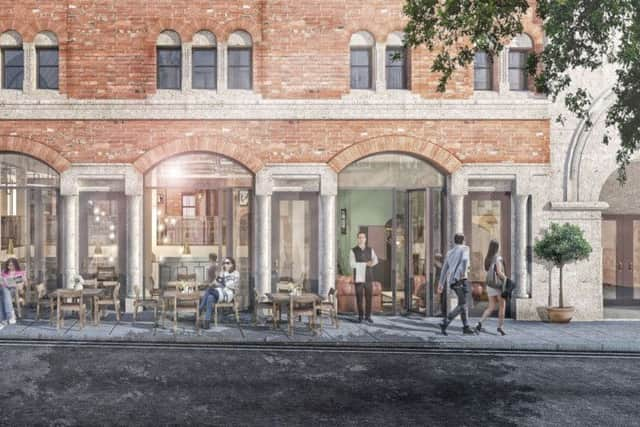Why Yorkshire theatre is the best it's ever been


A slightly unusual article this week that takes a look at a few different moments reflecting just where we are as a region – and how far we’ve come.
It’s worth stopping to take stock every now and then, something I often ask actors, directors and writers to do when I interview them for these pages.
Advertisement
Hide AdAdvertisement
Hide AdBack in 2004, when I first joined the Yorkshire Post, theatre in the region was strong, but the past decade has seen an increase in the strength of Yorkshire’s theatre industry that has left me staggered at times.


Since the early 2000s we’ve seen a £15m complete renovation of Sheffield’s Crucible, a new building for Opera North including the opening up of a second venue for the opera company in the Howard Assembly Room. There has also been the building of a brand new building for Hull Truck, John Godber has set up his own company based in Wakefield Theatre Royal, which itself this month sees the opening of a new extension and studio theatre. Bradford’s Theatre in the Mill has become one of the most important laboratories for new theatre work, Slung Low has become a company that is redefining what British theatre does; oh, and Hull landed the City of Culture title.
The list really does go on and on. You see why I felt the need to stop and take a look around.
I’m going to take you through three different things that crystallise just how strong this region is and just how fortunate we are to have the theatre we enjoy in Yorkshire.
Advertisement
Hide AdAdvertisement
Hide AdFirst of all, Matilda. The Royal Shakespeare Company production written by Tim Minchin and Dennis Kelly opened at the RSC in November 2010 and at the time people were unsure if Minchin, a well regarded musical comedian, would have the chops to create a new musical.


It transferred into the West End a year after opening in Stratford-upon-Avon and won several awards before later transferring to Broadway in 2013. Minchin had the chops and then some.
Now the show is going on the road for the first time and people are already flocking to buy tickets for the Bradford Alhambra performance of the show which arrives in the city in February next year, staying for almost a month.
I remember a few years ago I was at a screening at the National Media Museum and the person next to me was filling in a feedback form about their visit. They loved the museum, loved the screening, the only problem, they wrote on the form, was that they had to go to Bradford for the event. As a Bradfordian, that stung.
Advertisement
Hide AdAdvertisement
Hide AdThat the Bradford Alhambra is the only Yorkshire venue on the first national tour of Matilda matters, especially within the context of that cynical form filler. The theatre and its team, led by Adam Renton, has done a lot of work over the past decade to bring big productions to the city, with Lion King, Chitty Chitty Bang Bang and War Horse all paying a visit to Bradford.


At the other end of a different scale, the second thing I want to talk about is Opera North. My visits to the Leeds Grand Theatre to see the company have always seemed an odd experience because of a specific incongruity: the high art in the building sits in stark contrast to the cheap fast-food joints that sit outside it.
Many years ago I spoke with Opera North boss Richard Mantle about his plans to, hopefully, one day find a way to somehow create an atmosphere where the people in their nice frocks didn’t find said frocks covered in aroma de kebab when they arrived in the theatre.
This week Leeds City Council’s executive board has lent its support to plans by Opera North to take over a set of vacant shops next to its base at Leeds Grand Theatre. The £12m proposals will see the refurbishment of empty shop units and the opening of a bar and restaurant and create a new entrance for the brilliant Howard Assembly Room.
Advertisement
Hide AdAdvertisement
Hide AdIt will continue to lend to a Leeds economy, once seemingly built on little other than commerce, that is now putting culture at its heart. This latest decision by the city’s council to support Opera North is part of what feels like a wider new energy from decision makers around the region, from the Bradford Council chief executive Kersten England to the whole team who worked to make City of Culture such a success in Hull. The people in charge care that our cities have culture for citizens to experience and that makes a big difference.


Speaking of which, the third and final thing I wanted to write about takes us East to Hull.
A report published last week has given us the cold hard facts about why every argument, from moral to financial, has now been won when it comes to asking why we should fund the arts.
The University of Hull’s report has revealed that Hull’s year in the spotlight as UK City of Culture attracted an audience of more than five million people, £220m of investment and 800 new jobs.
Advertisement
Hide AdAdvertisement
Hide AdThe big statistic, though, is the one which reveals the number of the city’s residents who went to at least one cultural activity. This figure matters because I still, in my other life as a BBC Radio Leeds presenter, come across the opinion that spending money on culture doesn’t matter, or that public money spent on cultural activities is wasted.
The figure that proves this plain wrong headed is that 95 percent of people in Hull experienced at least one cultural activity during the city’s year of culture.
To adapt a quote, our cultural lives in Yorkshire are moving pretty fast. If we don’t stop to take a look around once in a while, we might forget to appreciate it.